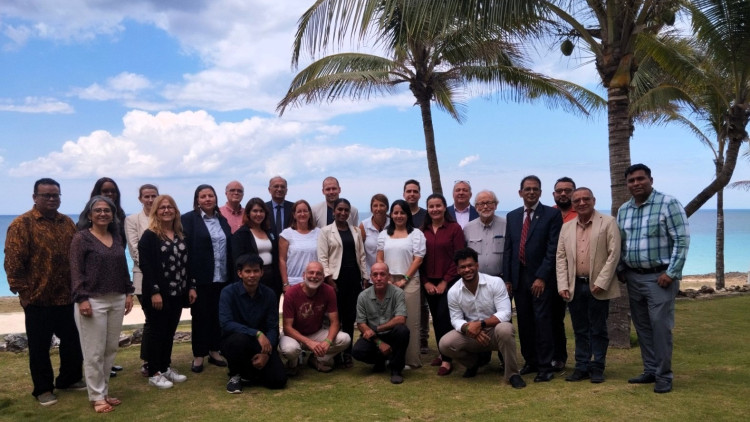The IAEA supports countries to better understand the ocean by developing networks of marine experts, facilitating regional knowledge exchange and harmonizing analytical and field procedures.
Monitoring Marine Health
As part of a new global IAEA project, Thailand is further enhancing its national monitoring of marine pollution. "[This] new IAEA ocean health project has provided Thailand with a great opportunity to further enhance its technical capabilities for more effective monitoring of various marine pollutants using nuclear and isotopic approaches, other advanced techniques, and harmonized protocols," explained Yutthana Tomnoi, Office of Atoms for Peace, Thailand. "Networking of local experts from several institutions responsible for marine contaminant investigations has been strengthened to generate high-quality data for a comprehensive national marine and coastal management policy."
This new project, launched in 2024, harnesses nuclear science to gain a more comprehensive understanding of ocean health. The multifaceted project fosters evidence-based decision-making by building capacity in the sampling, analysis and interpretation of ocean acidification and ocean pollutants, including biotoxins, mercury, radioactive pollution, polycyclic aromatic hydrocarbons and oil spills. Scientists are also being trained in the assessment of 'blue carbon' - the carbon captured by coastal ecosystems. Precise and comparable data are crucial for countries to create robust ocean health monitoring programmes. The IAEA, through its Marine Environment Laboratories, ensures that countries have the knowledge and tools they need to generate valuable information about ocean health. Through a series of IAEA technical cooperation programme workshops and capacity building activities, experts from around the world have already begun discussing harmonizing data collection procedures and sampling strategies, so that a broad range of ocean data is comparable for analyses.
"We have seen the benefits of a collaborative and international approach to ocean monitoring. We must remember that the ocean is a shared natural resource, and data collected by one country or region can give others insight into emerging challenges. The new global IAEA technical cooperation project hopes to leverage this by scaling up the scope of the IAEA's previous ocean monitoring efforts and facilitating more extensive international cooperation," said Petra Salame, IAEA Programme Management Officer.
At the recent United Nations Ocean Conference, UN Secretary General António Guterres acknowledged an urgent need for action to "turn the tide" on ocean conservation. Although there is mounting concern over ocean health, a lack of accurate scientific data on ocean deterioration is preventing well-informed decision-making on ocean issues. With support from the IAEA's research and development activities and its technical cooperation programme, countries around the world are filling this gap by building expertise in ocean monitoring. From tracking key indicators of ocean health - such as marine pollutants, harmful algal blooms, and ocean acidification - to researching blue carbon, new data is helping improve ecosystem management.
For instance, with IAEA support, the Philippines is now successfully using the 'radioligand receptor binding assay' technique in a national ocean monitoring programme to assess biotoxins in seafood caused by harmful algal blooms. Early detection of harmful algal blooms is key to protect communities from the serious health risks posed by consuming biotoxin-tainted seafood, which can cause illness and even death.
Studying Organic Carbon Storage in Wetland Ecosystems
Once equipped with expertise in nuclear and isotopic techniques, scientists can generate valuable data that can be used to improve wetland management. In the Asia and the Pacific region, more than 100 scientists have already been trained through the IAEA technical cooperation programme in the use of stable isotopic techniques to trace sources of organic carbon and understand trophic interactions within wetland ecosystems. In Indonesia and Thailand, scientists applied these techniques to reveal that large quantities of carbon are being stored in the rich soil of mangrove forests.
Addressing Ocean Acidification
Using nuclear techniques, scientists in Colombia and Cuba have been able to gather key data on minimizing and addressing ocean acidification through the Regional Observatory on Ocean Acidification. This data has provided a valuable contribution to Sustainable Development Goal 14 ('Life Below Water') reporting. The Regional Observatory, established in 2020 with the support of the IAEA, is part of the REMARCO Network, which enables the collaboration of 18 countries in Latin America and the Caribbean to address marine challenges using nuclear techniques.

The IAEA is supporting scientists to harmonize and standardize the sampling and analysis of marine toxins through targeted workshops. (Photo: K. Moeller/IAEA)






